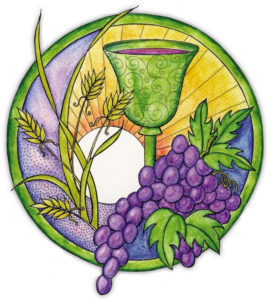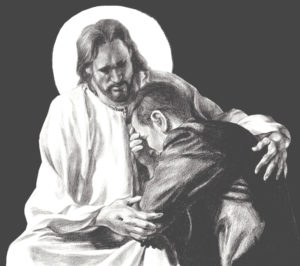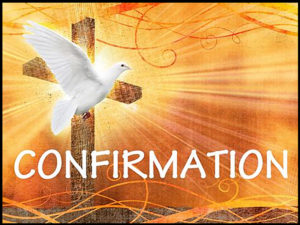Other Sacraments

Eucharist
The word 'Eucharist' means 'Thanksgiving.'
The greatest act of thanksgiving is the life and death of Jesus Christ, and in the Sacrament of the Eucharist we are made sharers in his perfect offering of praise and thanksgiving to God the Father.
Every Sunday, the Eucharist is celebrated four times. It is also celebrated on weekdays. The first half of the service is called the Liturgy of the Word, and Jesus who has called us together and who is present in our midst reveals himself in the words of the scriptures, the preaching of the kingdom and the prayers of the people.
The Liturgy of the Eucharist commences with the greeting of peace. Bread and wine is taken and blessed, the holy bread is broken and the gifts are made holy. We worship Jesus' presence and we offer to God his one, perfect sacrifice. In receiving his body and blood we share in the Lord's Supper of the upper room and we have a foretaste of the banquet of the kingdom of heaven.
We live by grace, and this means that we seek God's help in loving family members, friends and neighbours. We put out our hands to receive Jesus so that we can put out our hands to love those with whom we share our lives.
The bread used in the Eucharist is unleavened. The wine is fortified. The priest wears special clothes called vestments, and these remind us that the host at the meal is the risen Lord.
The Eucharist is celebrated with both joy and solemnity, and in the presence of Jesus we experience the power of his love, life and forgiveness.
Confirmation
The Sacrament of Confirmation is the second part of the Christian Baptism.
In the early Church, baptisms were performed in a building separate to the Church. After the naked candidate was baptised, they were anointed, clothed in white garments and led into the Church where the Bishop laid his hand upon them and prayed for an outpouring of the Holy Spirit. At the celebration of the Eucharist they would receive the Holy Communion for the first time.
Over time, the three parts of Christian initiation were separated, and with an increase in the number of infant baptisms confirmation and first communion was delayed.
Confirmation is a ministry of a Bishop. Before confirmation the candidate renews the promises of baptism and affirms Christian faith in the words of the ancient baptismal creed. With the laying on the Bishop's hand, initiation is completed, and the Christian can be regarded as a full member of the Church. The candidate is anointed with holy chrism, a sign that the Holy Spirit who has made us members of a royal priesthood renews us in our calling. Those who have been confirmed are reminded that they are empowered to be ministers of the Kingdom of God.
Young candidates for confirmation are usually aged eleven or twelve years. At a confirmation service there are usually a number of adult candidates. Sometimes candidates for confirmation are baptised at the service.

Reconciliation
The Sacrament of Reconciliation is the declaration of God's forgiveness made by a priest to a person who has made confession of sin. It is encouraged in the Book of Common Prayer, and it is an important part of Anglican spirituality. The Liturgy of the Church provides an order of service, and a time is advertised for people to come to the Church to make confession.
Confession is confidential, and the priest is not permitted to divulge the information that is shared by the penitent (the person making the confession). The penitent is encourage to speak simply and honestly, and if there is a matter that is a crime the penitent is encouraged to contact the police. Away from the confessional the priest is subject to the same requirements for divulging criminal information that apply to other people.
The Sacrament of Reconciliation is fourfold. First, the penitent is asked to examine their conscience and own up to their failure to love God and neighbour. Secondly, the penitent confesses their sin in the privacy of the confessional. Thirdly, the priest exercises authority to forgive sin. The last part of the Liturgy is an act of penance. This is not regarded as punishment but as an act whereby the teaching of Christ is reinforced. Sometimes the penitent is asked to read a passage of scripture, offer a particular prayer, or perform a good work that will help another person.

Anointing
In the Letter of James the elders of the Church are entrusted with the responsibility of anointing the sick. This is a sacrament for the sick, and with the offering of prayer the sick person is forgiven and healed.
The English word 'heal' means 'to be made whole.' Sometimes, the Sacrament of Anointing can make a great difference to a person's recovery from a bodily ailment. At other times, the person may not recover. But an absence of a physical cure does not mean that God is not working, for the process of wholeness is a process of restoration of the right relationship with God, with neighbour, with one self and with all of creation. Those who receive this sacrament invariably experience a great sense of peace.
Every year in Holy Week, the Bishop celebrates a mass of the holy oils. With the oil of catechumens and the oil of chrism (the oil used in baptism and confirmation), the oil of the sick is consecrated at a special service. Priests take small amounts of the three oils so that the can use them as the minister amongst their people. At church, in homes and in hospitals, a priest celebrates this sacrament by making the sign of the cross on the forehead and the hands of the sick person with the holy oil. It is to be administered for any illness, and not merely for those who are dying.
